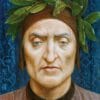From the veiled chapters of medieval lore to the intricate verses of sacred texts, the story of the craven angels has haunted humanity’s imagination for centuries. These ethereal beings, neither loyal to the divine nor rebellious with Satan, occupy a realm of ambiguity that defies simple categorization. Their tale is not one of heroism or outright damnation, but a lingering testament to the peril of neutrality in the face of moral conflict.
The fate of the craven angels has been a subject of shifting interpretations. From their sorrowful hymns on an island paradise to their grim role as guardians of the Gral, these enigmatic figures straddle the boundary between grace and condemnation. Their narrative, filled with celestial wonder and tragic undertones, offers a profound meditation on the choices we make — or fail to make.
The Island of Birds: Echoes of Divine Mercy
An eighth-century text, The Voyage of Saint Brendan, provides one of the earliest accounts of the craven angels’ fate. This legendary tale follows the seafaring Irish saint as he encounters a miraculous island teeming with white birds. These were no ordinary creatures; their wings chimed like celestial bells, and their song filled the air with sacred harmony.
Saint Brendan, filled with wonder and sorrow, prayed for understanding. One bird, serene and luminous, descended to reveal their plight:
After Satan’s fall, we did not sin, but neither did we stand firm in loyalty to the Almighty. For this, God’s justice cast us into exile. We are not condemned to suffer like the fallen, nor are we graced with the joy of the faithful. On holy days, we take these forms to sing praises to the Creator, but our exile endures for eternity.
In this depiction, the craven angels are tragic figures — not entirely lost, yet forever excluded from the fullness of divine fellowship. Their presence on Brendan’s journey offered a solemn reminder of the cost of inaction.
Guardians of the Gral: The Stone of Eternal Mystery
By the thirteenth century, the legend of the craven angels had evolved, casting them in a more foreboding light. Wolfram von Eschenbach’s Parzival weaves their story into the mythos of the Gral, a sacred stone imbued with divine power. In this version, the craven angels descend to Earth to guard the Gral, yet their exile remains a punishment, not a privilege.
Flegetanis, a pagan seer in Eschenbach’s tale, foresaw the craven angels’ ultimate fate. He declared:
They chose their own perdition. By refusing to take sides in Heaven’s war, they fell into an eternal limbo, bound to the Earth and the Gral until the end of days.
The Gral itself, a symbol of purity and salvation, becomes an ironic tether for these celestial exiles. Tasked with its protection, the craven angels remain close to divine mysteries, yet forever distanced from redemption.
Eschenbach’s interpretation adds a layer of moral absolutism to their story: inaction is not neutrality; it is a choice with its own consequences.
A Neutrality Damned: Dante’s Unforgiving Vision
Dante Alighieri (ca. 1265–1321) offered a starkly different portrayal of the craven angels in his immortal work, The Divine Comedy (Divina Commedia). These beings, who in earlier legends inspired a sense of sorrowful reverence, find no such sympathy in Dante’s cosmos.
In the vestibule of Hell — a liminal space neither within nor outside the infernal gates — the craven angels linger in eternal torment. For Dante, their refusal to choose allegiance was not a tragic failure but a cowardly rejection of duty. Their punishment reflects their indecision:
Neither Heaven nor Hell will claim them. Bereft of God’s presence and yet denied the finality of death, they are condemned to a restless eternity. The craven angels envy every other fate — even the torments of the damned.
This depiction strips the craven angels of the dignity afforded them in the Brendan Voyage. Dante transforms their neutrality into a sin as damning as rebellion, presenting them as unworthy of even Hell’s torments.
A Timeless Allegory
Across centuries and cultures, the tale of the craven angels continues to resonate. Their story shifts with each retelling, reflecting humanity’s ever-evolving understanding of morality, duty, and the consequences of choice. Are they tragic victims of cosmic justice, noble guardians of divine relics, or cowardly souls deserving of their exile?
In their eternal wandering, the craven angels stand as a mirror to human struggles with moral ambiguity. Their haunting songs, their mysterious connection to the Gral, and their restless exile serve as a reminder: neutrality in the face of great conflict is itself a profound choice — one with consequences that may echo beyond time itself.
THAT NOISOME CHOIR

Dante Alighieri (ca. 1265–1321)
Divina Commedia
These miserable ways
The forlorn spirits endure of those who spent
Life without infamy and without praise.
They are mingled with that caitiff rabblement
Of the angels, who rebelled not, yet avowed
To God no loyalty, on themselves intent.
Heaven chased them forth, lest, being there, they cloud
Its beauty, and the deep Hell refuses them,
For, beside these, the wicked might be proud.
[Questo misero modo
tegnon l’anime triste di coloro
che visser sanza ’nfamia e sanza lodo.
Mischiate sono a quel cattivo coro
de li angeli che non furon ribelli
né fur fedeli a Dio, ma per sé fuoro.
Caccianli i ciel per non esser men belli,
né lo profondo inferno li riceve,
ch’alcuna gloria i rei avrebber d’elli.]



